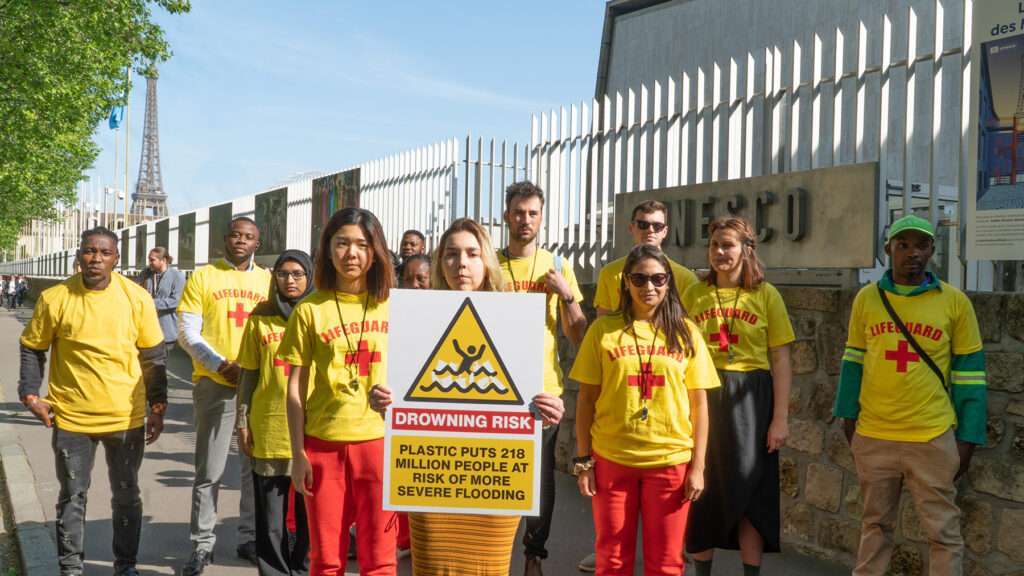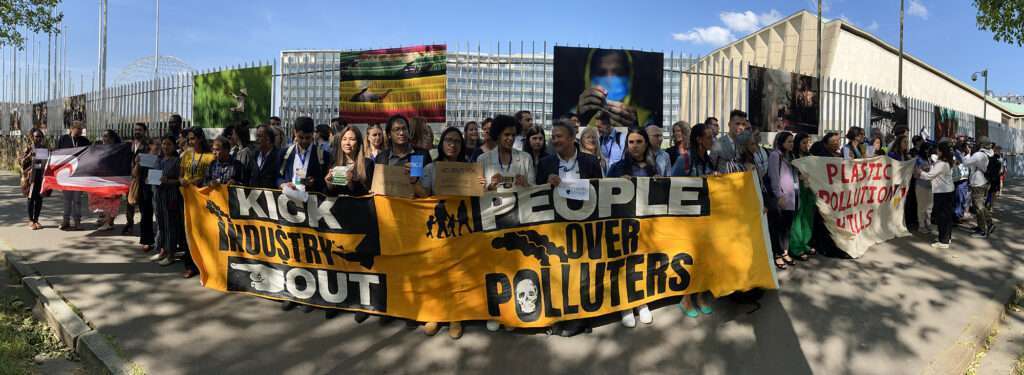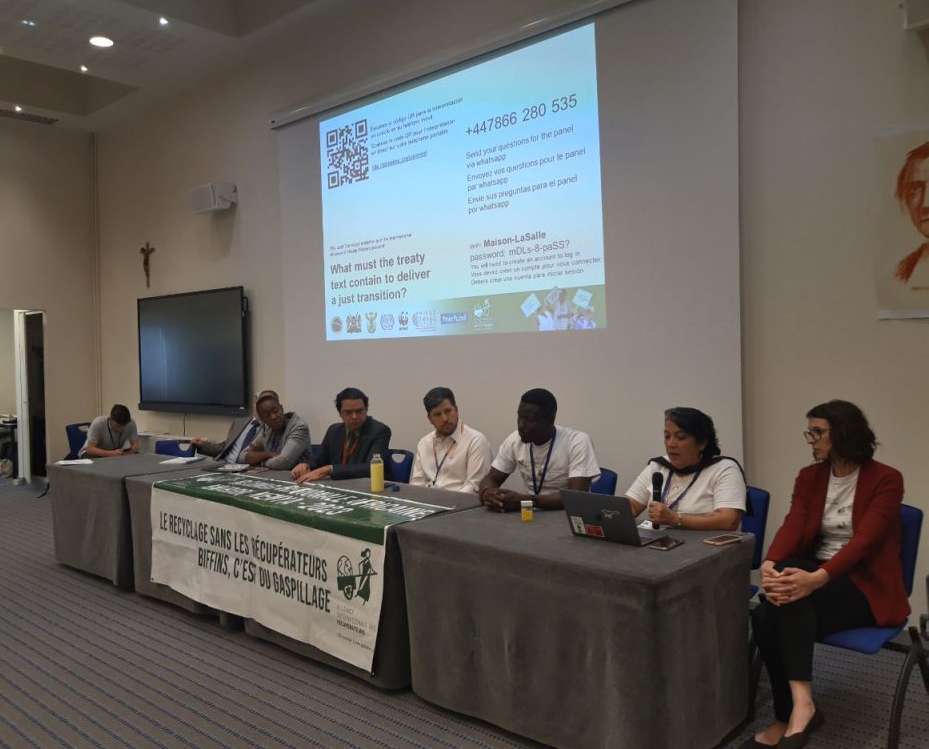Last month, the Environmental Justice Communities Against Plastics (EJCAP) coalition joined 1500 representatives of UN member states, civil society groups and corporate lobbyists at the UN Plastics Treaty talks in Paris. Along with Physicians for Social Responsibility–Los Angeles (PSR-LA), Just Transition Alliance was there representing EJCAP, to assess the political opportunity for EJ groups from the US to meaningfully engage at this global policy arena and help shape a legally binding instrument to stop the harm caused by plastics pollution. This was only the 2nd meeting of the Intergovernmental Negotiating Committee (INC 2), tasked with drafting a proposal for the UN Environment Assembly to consider at the end of 2024.

Break Free From Plastics organizers and Alliance of International Waste Picker representatives organize lifeguard action outside UN Plastics Treaty talks. Photo credit: Tearfund/Adam Aucock
Plastic pollution has become one of the most urgent aspects of the global ecological crisis we face today, interwoven with climate chaos, growing toxic pollution loads, biodiversity destruction and the poisoning of land and water ecosystems we all rely on. Recent studies have estimated that the amount of microplastics ingested by humans through our food and water is equivalent to a credit card per individual each week. Other studies estimate that at current growth levels, plastics in the world’s oceans will outweigh the world’s fish stocks by the year 2050.
In addition to this global challenge, plastics production (over the last three decades) has decimated countless local economies, destroying livelihoods especially in the global south where millions of people once made a living from producing safer, natural alternatives that have been pushed out of the markets by disposable products. Many see plastics as a form of waste colonialism, where wealthy American and European corporations like Coca Cola, Pepsico and Nestle (the world’s three largest plastics producers) profiteer from polluting the waters, ecosystems and bodies of the poor. And the production of single-use plastics is higher than it has ever been before.
When we were contacted this spring by our friends at the Global Alliance for Incinerator Alternatives (GAIA) and others engaging at these treaty talks, we began discussions with our sister organizations of EJCAP, as well as key labor allies about what a just transition away from the plastics-petrochemical industrial complex should look like. This conversation has popped up all over the place of late, especially where the UN Plastics Treaty stands to impact the lands, labor and livelihoods of countless frontline communities and workers around the world. There are over twenty million workers around the world who make a living from sorting through society’s discards and collecting, recycling and reusing waste materials. These are some of the poorest workers around the world, and over the last decade their unions have formed the International Alliance of Waste-pickers, to engage such global policy arenas.
At INC 2, we were able to reconnect with many old friends and comrades from both GAIA and waste worker unions from global south countries like India, South Africa and Brazil. At the very start of this conference we all got together for a protest outside the UNESCO headquarters – to bring attention to the fact that many community and worker representatives from the global south were denied visas to attend these talks, while scores of corporate lobbyists appeared to have carte-blanche access to the venue.

Protesting frontline community and worker exclusion from INC 2 in Paris. Photo credit: Alliance of International Waste Pickers
Takeaways from INC 2
Over the course of the week, we found ourselves cloistered in the UN building late into the night, as the technical teams of UN member states negotiated both rules of procedure (such as consensus decision-making) as well as draft text for the substance and structure of a global mechanism. Both civil society delegates and corporate lobbyists like the American Chemistry Council stayed up late to utilize the few minutes spared for non-governmental stakeholders to provide input. By the end of the week, a few things became evident:
- Being early in this process (INC 2 was only the second of 5 meetings in the lead up to a draft being presented to the UN General Assembly), there appears to be more opportunity for civil society groups to influence and shape the direction of this treaty than any other UN policy arenas we have engaged in to date – including the UNFCCC and the Convention on Biodiversity.
- Civil society forces were better aligned and coordinated than at other global policy arenas, thanks to the hard work of our allies with GAIA, Break Free from Plastics Plastics (BFFP), waste worker unions and many others. And while there is still much room for improvement of both strategy and joint principled practice, these allied formations have taken the first steps to include the voices of Indigenous, EJ and other frontline communities.
- Our allied civil society power and influence in this arena appears to be effective at thwarting influence from the other side, the lobby groups from the plastics-petrochemical industrial complex. And while we were well-prepared to expose and debunk the many neoliberal market schemes and bogus techno-fixes like Chemical Recycling being advanced by these lobbyists, it was disconcerting to witness the pollution profiteers dividing our ranks by engaging larger NGOs and trade union confederations in spurious discourse on issues like plastics circularity, plastics pollution credits and other false solutions.
- Diligent interventions by EJ and waste worker organizers at INC 2 resulted in the introduction of critical treaty text on Just Transition, and the needs of frontline communities, waste workers and Indigenous Peoples, acknowledging the importance of centering the priorities of those most harmed. While we need to ensure these terms are not tokenized and watered down, it is notable that dozens of member states have voiced support for their inclusion in this proposal.
- Despite the significant opportunity to shape the outcomes of these treaty talks, the few resources currently allocated to NGO efforts continues to exclude participation of Indigenous and EJ communities, waste workers and other marginalized peoples impacted by plastics. Our larger, international NGO allies still need to understand the core EJ principle of “Let People Speak For Themselves” – they need to refrain from cherry-picking individual activists to represent our movements, and share funding so that frontline community groups can organize our own delegations.

Waste worker and Just Transition side event, organized by Alliance of International Waste Pickers. Photo credit Alliance of International Waste Pickers
Can we make a difference at these treaty negotiations?
Returning to Turtle Island (so-called North America), we are presently advising our allied movements that there is indeed a window of opportunity to engage, and shape a treaty to end the plastics paradigm. With three more INC meetings in Kenya, Canada and South Korea being planned, our involvement in the next 1.5 years could help deliver a treaty that leverages meaningful action on the ground, to both end plastics production and start us on pathways of community and worker-led solutions.
While EJ community priorities need to remain focussed on frontlines of various plastics struggles like waste incinerators, landfills, cement kilns, ethylene crackers, pipelines, cement kilns, hydraulic fracturing projects and other toxic threats, engaging in full force at this global treaty could tip the balance of power in favor of our side – especially where we can work to starve the pollution profiteers of the structural subsidies and market incentives that continue to prop up the plastics paradigm.
However, in order to effectively engage in these treaty talks, Indigenous and EJ communities need to be adequately funded to bring our own thought-leadership to the table. And between these INC meet-ups, we need to commence just transition dialogues with waste workers and other unions representing labor along the entire plastics death-cycle, from extraction to production, consumption to disposal. This is the base-building power we most urgently need to organize and align, if we are to succeed in overcoming the influence of the polluters and their allied lobbyists at the UN.
Bringing together the houses of EJ and Labor will allow us to cultivate the shared vision, common cause and self-determination of communities and workers most impacted. These are the essential ingredients that we need in order to unravel the complex puzzle of replacing the entire “dig, burn, drive, dump” model of plastics production, with localized, community and worker controlled, zero waste economies that serve the essential needs of people and planet.
